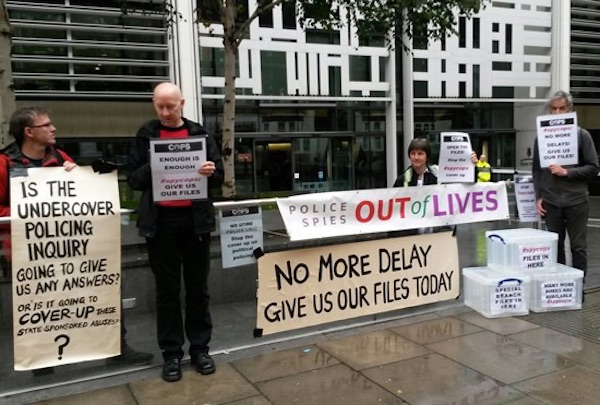
Sinn Fein and the Northern Ireland Civil Rights Association (NICRA) were infiltrated by an undercover British police unit which is currently the focus of a major inquiry in England.
Details of a cover name used by a member of the squad to infiltrate Sinn Fein in London was made public for the first time.
While republican groups have always been targeted by British spy agencies, evidence put before the Undercover Policing Inquiry of their infiltration of the Civil Rights Association has raised eyebrows.
NICRA was formed in 1968 in response to discrimination against nationalists by the unionist regime at Stormont and advocated peaceful and pacifist methods.
The Special Demonstration Squad (SDS) was a unit that infiltrated political groups and whose officers were drawn from London police. A former officer, who used the alias ‘Sean Lynch’ and who has since died, worked undercover in the unit between 1968 and 1974.
The inquiry has revealed that he is believed to have infiltrated the NICRA, Sinn Fein in London and a group called the Irish Civil Rights Solidarity Campaign (ICRSC).
Eamonn McCann of People before Profit, who was a member of both the NICRA and ICRSC, said he had no doubt there was widespread surveillance.
“It’s now obvious that undercover police officers, intelligence and security officers were infiltrating everything,” he said. “It was very difficult to judge what was real infiltration and what was not because there was a high level of paranoia.”
‘Sean Lynch’ is one of several members of the SDS that went undercover in groups connected to the wider republican movement in the early 1970s. They include an individual who is believed to have used the name ‘Alex Sloan’ to penetrate the Irish National Liberation Solidarity Front (INLSF) between 1971 and 1973.
According to the inquiry the former police officer, who is now in his 70s, has expressed concern about the “physical safety of himself and his family” if his real name is published.
It was previously revealed that a spy who operated under the fictitious name of “Rick Gibson” between 1974 and 1976 infiltrated the England-based ‘Troops Out Movement’, which campaigned to end British rule in the North of Ireland.
Another such ‘spycop’, Mark Kennedy, operated in Ireland on a number of occasions between 2004 and 2006 while posing as an environmental activist called Mark Stone. However, the inquiry will not examine the conduct of officers outside of England and Wales, despite repeated calls for Ireland to be included.
Martin Callinan, the former Garda police commissioner, refused to deny that he gave permission for undercover British police to work in Ireland. He defended arrangements that the gardai “could have” with British police without the Dublin government being informed.
The British government remains highly secretive about historical spying, even extending to events which took place more than 100 years ago. It was recently revealed that it is still refusing to release documents related to informers from the late 19th century as well as the build up to the Easter Rising.
One file, titled ‘Paid Informants in Irish Secret Societies 1886-1910’ is known to be in the British National Archive, although the British Home Office and London Police have refused to release the files.
Sinn Fein MEP Lynn Boylan has reiterated her call for the inquiry to be extended to cover the north of Ireland, and is now seeking legal advice on the possibility of Sinn Fein becoming involved in the inquiry.
![[Irish Republican News]](https://republican-news.org/graphics/title_gifs/rn.gif)
![[Irish Republican News]](https://republican-news.org/graphics/title_gifs/harp.gif)

